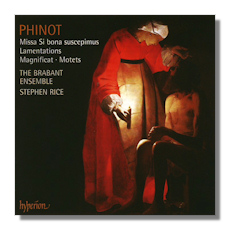
The Internet's Premier Classical Music Source
Related Links
- Sermisy Reviews
- Latest Reviews
- More Reviews
-
By Composer
-
Collections
DVD & Blu-ray
Books
Concert Reviews
Articles/Interviews
Software
Audio
Search Amazon
Recommended Links
Site News
 CD Review
CD Review
Franco-Flemish Renaissance Polyphony

- Dominique Phinot (c1510-before 1561):
- Pater peccavi
- Missa Si bona suscepimus
- Tanto tempore
- Iam non dicam vos servos
- O sacrum convivium
- Incipit oratio Jeremiae prophetae
- Magnificat octavi toni
- Confitebor tibi, Domine
- Claudin de Sermisy (1490-1562): Si bona suscepimus
The Brabant Ensemble/Stephen Rice
Hyperion CDA67696
This is a very welcome CD from Hyperion of remarkably beautiful Renaissance choral polyphony by the accomplished and ever-affecting Brabant Ensemble under their enterprising conductor, Stephen Rice. It's all the more remarkable since Dominique Phinot, who lived from about 1510 to some time before 1561 when he was executed – probably for his sexual orientation, is otherwise all but unrepresented in the current catalog. Yet his music holds its own with that of most of his contemporaries. If you enjoy music from this period or wish to hear an example of its interpretation that is in every way excellent, persuasive, sensitive and so compelling that, as soon as the last resonant note has died away (rather abruptly, actually), you return to the start to listen again, then don't hesitate to get this CD.
From his name we can assume that Phinot was not Italian, but Franco-Flemish. We know next to nothing about him; a few documents place him in Urbino in the middle of the sixteenth century. His output was significant: two masses, a magnificat, over a hundred motets, two books each of French chansons and Italian madrigals as well as settings of Vesper psalms. Few listeners – even specialists of the period – can be aware of what promises to be something of a treasure trove, if what is recorded here is anything to go by. Indeed, it's the intention of Rice and the Brabant Ensemble to bring to our attention the significant amount of music from the first half of the sixteenth century which is still to be explored.
Phinot was not so obscure to his contemporaries. They placed him alongside the likes of Clemens non Papa, Crecquillon, Willaert and even Gombert as worthy successors to Josquin. To be sure, Phinot inhabits the same sound world, and is concerned to achieve similar results to those of Josquin. But he makes one significant departure. Namely, the way he handles polychoral arrangements: his dialog writing for two choirs in some ways prefigures that of the Venetian school of up to a century later. There are several pieces on this CD which illustrate this splendid technique… Tanto tempore [tr.8], Iam non dicam vos servos [tr.9], O sacrum convivium [tr.10], for instance. And of particular note in this respect is the breathtakingly beautiful Incipit oratio Jeremiae prophetae, the single longest work on the CD. The emotional and expressive range of this work is significant. The Brabant Ensemble's attention to dynamic range, and to varying tempi, make this a particularly pleasing work – also polychoral, and divided into several sections, though not as is usually the case, corresponding to the initial Hebrew letters.
The motet, Si bona suscepimus, by de Sermisy, on which the Mass is based is also included on this CD. The Mass is full of the same emotional and expressive charges as the other works here. The repetition at the end of the movements of the phrase, "sit nomen Domini benedictum" ("Blessed be God's name"), for example, suggests an insistence bound with faith that is hard to overlook. Phinot's use of extensive melismata confers a joy (an ecstasy at times, almost) and hope upon the work that belie its origins in the book of Job.
This individuality and self-confidence would seem to be typical of Phinot. Although one is also reminded of the masses of Palestrina (indeed it has been said that without Phinot there would have been no Palestrina), the appeal of the singing on this generous (at an hour and a quarter) CD is not primarily historical. When the booklet hints that this is the "first" of music by Phinot, one's positive response is based not so much on any additional light which possible subsequent performances might be able to shed on the composer. Rather we should be excited at the prospect of hearing more of such fluid, emotionally rich, yet tight and focused choral music that is so well understood and sung by the Brabant Ensemble. It's their gentle and unassuming style, which is equally matched by insight and even-paced certainty that is their great strength. Similarly their measured infusion of drama into music two of whose other outstanding characteristics are intelligence and sensitivity to pathos.
The acoustic is perfect for the music: neither too dry nor intrusively reverberant – the chapel of Harcourt Hill campus, Oxford Brookes University. The booklet is well up to Hyperion's usual standards with all the texts (in Latin and English), background information and photographs on The Brabant Ensemble and Rice, who also co-wrote the necessary essay on the composer and music. Very strongly recommended.
Copyright © 2009, Mark Sealey




















